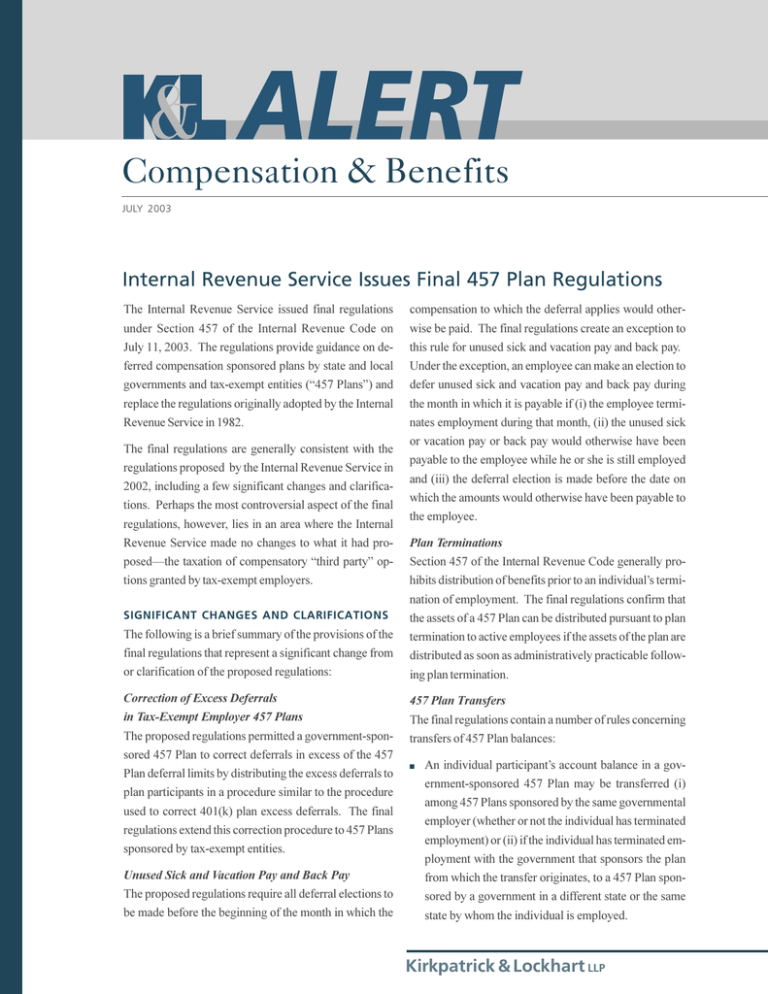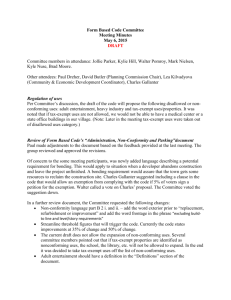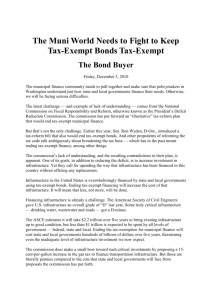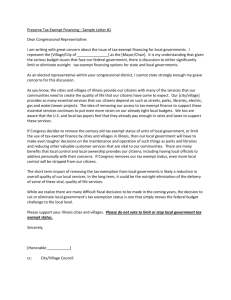
Compensation & Benefits
JULY 2003
Internal Revenue Service Issues Final 457 Plan Regulations
The Internal Revenue Service issued final regulations
under Section 457 of the Internal Revenue Code on
July 11, 2003. The regulations provide guidance on deferred compensation sponsored plans by state and local
governments and tax-exempt entities (457 Plans) and
replace the regulations originally adopted by the Internal
Revenue Service in 1982.
The final regulations are generally consistent with the
regulations proposed by the Internal Revenue Service in
2002, including a few significant changes and clarifications. Perhaps the most controversial aspect of the final
regulations, however, lies in an area where the Internal
Revenue Service made no changes to what it had proposedthe taxation of compensatory third party options granted by tax-exempt employers.
SIGNIFICANT CHANGES AND CLARIFICATIONS
The following is a brief summary of the provisions of the
final regulations that represent a significant change from
or clarification of the proposed regulations:
Correction of Excess Deferrals
in Tax-Exempt Employer 457 Plans
The proposed regulations permitted a government-sponsored 457 Plan to correct deferrals in excess of the 457
Plan deferral limits by distributing the excess deferrals to
plan participants in a procedure similar to the procedure
used to correct 401(k) plan excess deferrals. The final
regulations extend this correction procedure to 457 Plans
sponsored by tax-exempt entities.
Unused Sick and Vacation Pay and Back Pay
The proposed regulations require all deferral elections to
be made before the beginning of the month in which the
compensation to which the deferral applies would otherwise be paid. The final regulations create an exception to
this rule for unused sick and vacation pay and back pay.
Under the exception, an employee can make an election to
defer unused sick and vacation pay and back pay during
the month in which it is payable if (i) the employee terminates employment during that month, (ii) the unused sick
or vacation pay or back pay would otherwise have been
payable to the employee while he or she is still employed
and (iii) the deferral election is made before the date on
which the amounts would otherwise have been payable to
the employee.
Plan Terminations
Section 457 of the Internal Revenue Code generally prohibits distribution of benefits prior to an individuals termination of employment. The final regulations confirm that
the assets of a 457 Plan can be distributed pursuant to plan
termination to active employees if the assets of the plan are
distributed as soon as administratively practicable following plan termination.
457 Plan Transfers
The final regulations contain a number of rules concerning
transfers of 457 Plan balances:
n
An individual participants account balance in a government-sponsored 457 Plan may be transferred (i)
among 457 Plans sponsored by the same governmental
employer (whether or not the individual has terminated
employment) or (ii) if the individual has terminated employment with the government that sponsors the plan
from which the transfer originates, to a 457 Plan sponsored by a government in a different state or the same
state by whom the individual is employed.
Kirkpatrick & Lockhart LLP
n
n
n
The assets of an entire government-sponsored 457
Plan may be transferred to another 457 Plan sponsored
by a government within the same state.
the fair market value of the underlying stock at the time of
exerciseis treated as ordinary income and taxed at the
time the options are exercised.
457 Plan assets may be transferred to a governmentsponsored defined benefit plan maintained by a government in the same state as the 457 Plan for the purpose of purchasing permissive credit under the defined
benefit plan.
Options to acquire employer stock are not a feasible form
of compensation for tax-exempt employers. In an effort to
compete with nontax-exempt employers, some tax-exempt
employers have sought to offer their executives discounted options to acquire third party stock or shares of
third party mutual funds or other property.
Assets may be transferred among 457 Plans sponsored
by tax-exempt employers with respect to participants
who have terminated employment with the employer
initiating the transfer.
Rollovers
The final regulations do not resolve the open issue of
whether amounts rolled into a government-sponsored 457
Plan from another 457 Plan, a qualified retirement plan or
an individual retirement account (IRA) may be distributed
to an individual prior to his or her termination of employment with the sponsor of the recipient plan. The Internal
Revenue Service intends to address this issue later this
year.
The final regulations clarify that for purposes of determining whether amounts distributed from a 457 Plan are attributable to rollovers from qualified retirement plans,
403(b) plans or IRAsand, therefore, unlike other 457
Plan amounts, subject to the 10% excise tax applicable to
distributions before age 59-1/2the Internal Revenue
Service will apply the accounting and ordering rules established by the 457 Plan. To ensure that the 10% excise
tax will not be applied to assets rolled over from another
government-sponsored 457 Plan, the plan should separately account for those assets.
THIRD PARTY OPTIONS
Employers frequently compensate their executives by
granting them options to acquire shares of the employers
stock. In the case of nonqualified options, the exercise
price for the options is often set below the fair market
value of the underlying stock on the date the option is
grantedi.e., the exercise price is discounted. Under Section 83 of the Internal Revenue Code, nonqualified options are not taxed at the time they are granted (assuming
the options are not publicly traded) and the spreadthe
difference between the exercise price for the options and
It has long been unclear whether third party options
granted by tax-exempt employers are taxed like conventional options under Section 83 of the Internal Revenue
Code or as deferred compensation under Section 457(f) of
the Internal Revenue Code. Section 457(f) of the Internal
Revenue Code contains the rules for so-called ineligible
457 Plansdeferred compensation plans sponsored by
state or local governments or tax-exempt entities that do
not meet the requirements for the tax-favored treatment
that applies to eligible 457 Plans under Section 457(b) of
the Internal Revenue Code.
The ineligible 457 Plan rules generally provide that deferred compensation promised by a tax-exempt employer
is taxed when it is vested. Thus, if third party options are
treated as an ineligible deferred compensation plan, the
executive must pay tax on the option spread at the time
the options become vestedrather than at the time the
option is exercisedthereby limiting the effectiveness of
third party options as an executive compensation tool for
tax-exempt organizations.
The Internal Revenue Service concluded in the proposed
regulations that third party options offered by tax-exempt
employers are treated as ineligible deferred compensation
plans under Section 457(f) of the Internal Revenue Code
and the spread built into those options is, therefore, taxable to the executive when the options become vested.
However, the Internal Revenue Service invited public comment on this conclusion, leaving tax-exempt employers
and executives some hope that the Internal Revenue Service would change its position.
Unfortunately, notwithstanding the substantial objections
voiced by the tax-exempt community through the public
comment process, the final regulations confirm the approach of the proposed regulations. It appears, therefore,
that any relief on the tax treatment of third party options
for tax-exempt employers and executives will have to come
from Congress in the form of new legislation.
EFFECTIVE DATE
The final 457 Plan regulations are retroactively effective
for tax years beginning after December 31, 2001. However, for tax years beginning after December 31, 2001 and
before January 1, 2004, a failure to comply with the final
regulations will not be treated as a violation of Section 457
of the Internal Revenue Code if the 457 Plan is otherwise
operated in accordance with a good faith, reasonable interpretation of Section 457. A 457 Plan will be treated as
operated in accordance with a good faith, reasonable interpretation of Section 457 if operated prior to January 1,
2002 in accordance with the 1982 regulations.
Significantly, the final regulations create an exception to
the January 1, 2001 effective date for distributions of
rollover amounts prior to termination of employment. The
Internal Revenue Service anticipates resolving this issue
before December 31, 2003 and will make the rule applicable to that issue effective for years beginning after December 31, 2003.
Finally, the final regulations retain the special effective
date for third party options contained in the proposed
regulations: Section 457 of the Internal Revenue Code
will not apply to third party options granted on or before
May 8, 2002.
MICHAEL A. HART
mhart@kl.com
412.355.6211
If you have questions or would like more information about K&Ls Employee Benefit Plans/
ERISA practice, please contact one of our compensation and benefits lawyers listed below.
Stephen E. Moore
Boston
617.951.9191
smoore@kl.com
William P. Wade
Los Angeles
310.552.5071
wwade@kl.com
David E. Morse
New York
212.536.3998
dmorse@kl.com
William T. Cullen
Michael A. Hart
J. Richard Lauver
Charles R. Smith
Richard E. Wood
Linda B. Beckman
Douglas J. Ellis
Pittsburgh
Pittsburgh
Pittsburgh
Pittsburgh
Pittsburgh
Pittsburgh
Pittsburgh
412.355.8600
412.355.6211
412.355.6454
412.355.6536
412.355.8676
412.355.6528
412.355.8375
wcullen@kl.com
mhart@kl.com
rlauver@kl.com
csmith@kl.com
rwood@kl.com
lbeckman@kl.com
dellis@kl.com
Laurence A. Goldberg
Kathleen M. Meagher
Katherine L. Aizawa
Marc R. Baluda
San Francisco
San Francisco
San Francisco
San Francisco
415.249.1043
415.249.1045
415.249.1044
415.249.1036
lgoldberg@kl.com
kmeagher@kl.com
kaizawa@kl.com
mbaluda@kl.com
William A. Schmidt
Eric Berger
Washington
Washington
202.778.9373
202.778.9473
william.schmidt@kl.com
eberger@kl.com
®
Kirkpatrick & Lockhart LLP
Challenge us. ®
www.kl.com
BOSTON
n
DALLAS
n
HARRISBURG
n
LOS ANGELES
n
MIAMI
n
NEWARK
n
NEW YORK
n
PITTSBURGH
n
SAN FRANCISCO
n
WASHINGTON
...............................................................................................................................................................
This publication/newsletter is for informational purposes and does not contain or convey legal advice. The information herein
should not be used or relied upon in regard to any particular facts or circumstances without first consulting a lawyer.
© 2003 KIRKPATRICK & LOCKHART LLP.
ALL RIGHTS RESERVED.




